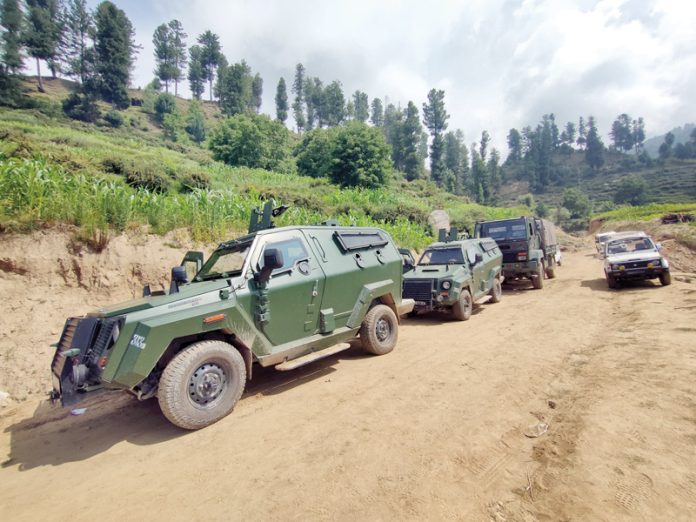Another violent encounter in the Doda district, resulting in the tragic loss of four soldiers, including an officer, marks yet another grim chapter in the ongoing conflict in Jammu and Kashmir. This incident is a stark reminder of the prevalent terrorism in the region, which had witnessed a period of relative calm but has seen a resurgence over the past few months. The gravity of this situation demands a comprehensive and multifaceted response from the Government and security forces, as well as a re-evaluation of the socio-political strategies aimed at stabilising the region.
A joint operation by the Rashtriya Rifles and the SOG of Jammu and Kashmir Police in the Desa forest belt of Doda district led to a deadly encounter with heavily armed terrorists. Despite the challenging terrain and thick foliage, the security forces engaged the militants in a fierce firefight. Tragically, four soldiers, including an officer, succumbed to their injuries, underscoring the high cost of maintaining security in this troubled region. The Army’s 16 Corps, also known as the White Knight Corps, confirmed the operation and the subsequent heavy firefight, indicating the gravity of the situation. Additional troops were mobilised to track and neutralise the terrorists, highlighting the continued threat posed by these militants, who are believed to have infiltrated from across the border.
This encounter is not an isolated incident. It follows a pattern of escalating violence in Jammu and Kashmir, particularly in the Jammu region. A week prior, a terrorist ambush in the Machedi forest belt of Kathua district resulted in the deaths of five soldiers. Similarly, terrorists managed to escape after an encounter in the nearby Ghadi Bhagwah forest on July 9, and three foreign terrorists were killed in a day-long operation in the Gandoh area on June 26. The intensity of these attacks and the sophistication of the militants suggest a well-coordinated effort to destabilise the region. Since October 2021, there has been a notable increase in terror activities, particularly in the districts of Jammu Division. These areas have seen some of the deadliest attacks, attributed to attempts by Pakistani handlers to revive terrorism in the Jammu region. The statistics are grim: over 70 people, including 52 security personnel, have been killed in terror-related incidents since 2021.
The resurgence of terrorism in Jammu and Kashmir must be viewed within the broader security context of the region. The relative peace experienced between 2005 and 2021 resulted from sustained counter-terrorism operations and political efforts to integrate the region into the broader Indian socio-political fabric. However, the recent spike in violence suggests that these measures may no longer be sufficient or effective. The role of Pakistan in fomenting unrest cannot be overlooked. Cross-border infiltration and support for terrorist groups continue to pose significant challenges to security forces. The recent attacks have highlighted the need for more robust border security measures and intelligence gathering to preempt such threats.
Each encounter with terrorists, whether involving the army or other security forces, has a common issue: terrorists often manage to escape. It’s well known that terrorists are highly familiar with the terrain, enabling them to dodge security forces. Frequently, security forces rush into forested areas, resulting in heavy casualties. In the recent Doda encounter, security forces engaged terrorists during the night, disregarding certain SOPs and specific guerrilla warfare instructions. Despite being well-equipped with drones and modern gadgets, these resources are not deployed at the onset of encounters. Repeatedly applying the same failed strategies is unacceptable.
Terror incidents have occurred in eight out of ten districts in the Jammu region, indicating widespread network penetration and coordination among terror modules. Alarmingly, terrorists are reaching non-border districts in Jammu and Kashmir, which underscores local support in transportation, logistics, shelter, and food provision. Local intelligence has failed to dismantle the OGW nexus, a critical issue the Jammu and Kashmir Police must address. The announcement of the immediate deployment of army and paramilitary forces in hilly areas did not prevent the latest encounter, marking another setback. Until the administration and security forces tackle radicalization, OGWs will continue assisting terror modules. The lure of easy money entices disgruntled elements of society, and authorities have struggled to counter these issues, resulting in escalating terror incidents.
A comprehensive, long-term strategy is urgently needed. While military and security measures are crucial, they alone cannot address the root causes of the conflict in Jammu and Kashmir. The socio-political dimensions of the issue must be tackled with equal vigour. Habitats near border areas require increased attention from intelligence and security agencies to counter infiltrations and terrorist movements. While eliminating terrorists is a top priority, safeguarding soldiers is equally crucial. Intelligence and patience are key in counter-terror operations and must not be overlooked. The existing loopholes must be addressed promptly. Strong actions against terror sympathisers are essential. Hard decisions may be necessary, as nothing is more important than national security. Additional security cover should be provided wherever necessary, and strengthening VDGs should be a top priority. VDGs are the first line of defence and are highly effective against terrorists in remote areas. An unarmed populace cannot counter terrorists or their sympathizers. Local police and VDGs must play a crucial role in this war against terrorism. Each district needs to develop a detailed strategy to counter the renewed threat, and citizens must come forward with vital information. High-level coordination and periodic review of action plans are essential.
The resurgence of terrorism, exemplified by the tragic encounter in Doda, poses a significant challenge to the region’s security and economic activities. Each terror incident has its own lasting impact. There is no room for leniency or complacency in this fight against terrorism. Current counter-terrorism measures require a thorough and immediate analysis. Security forces are beyond any doubt capable of countering the prevalent situation. Additional efforts are essential to ensure everyone’s safety, and these must be implemented without delay. Only through such a multifaceted approach can the cycle of violence be broken.
Trending Now
E-Paper


